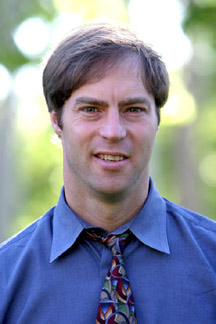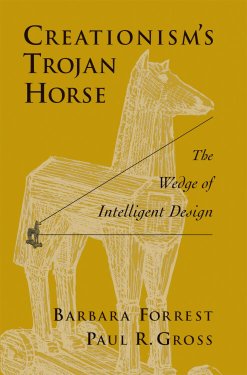Intelligent design (ID) is a pseudoscientific argument for the existence of God, presented by its proponents as "an evidence-based scientific theory about life's origins". Proponents claim that "certain features of the universe and of living things are best explained by an intelligent cause, not an undirected process such as natural selection." ID is a form of creationism that lacks empirical support and offers no testable or tenable hypotheses, and is therefore not science. The leading proponents of ID are associated with the Discovery Institute, a Christian, politically conservative think tank based in the United States.
The Discovery Institute (DI) is a politically conservative non-profit think tank based in Seattle, Washington, that advocates the pseudoscientific concept of intelligent design (ID). It was founded in 1991 as a non-profit offshoot of the Hudson Institute.

William Albert Dembski is an American mathematician, philosopher and theologian. He was a proponent of intelligent design (ID) pseudoscience, specifically the concept of specified complexity, and was a senior fellow of the Discovery Institute's Center for Science and Culture (CSC). On September 23, 2016, he officially retired from intelligent design, resigning all his "formal associations with the ID community, including [his] Discovery Institute fellowship of 20 years". A February 2021 interview in the CSC's blog Evolution News announced "his return to the intelligent design arena".
Phillip E. Johnson was a UC Berkeley law professor, opponent of evolutionary science, co-founder of the pseudoscientific intelligent design movement, author of the "Wedge strategy" and co-founder of the Discovery Institute's Center for Science and Culture (CSC). He described himself as "in a sense the father of the intelligent design movement". He was a critic of Darwinism, which he described as "fully naturalistic evolution, involving chance mechanisms and natural selection". The wedge strategy aims to change public opinion and scientific consensus, and seeks to convince the scientific community to allow a role for theism, or causes beyond naturalistic explanation, in scientific discourse. Johnson argued that scientists accepted the theory of evolution "before it was rigorously tested, and thereafter used all their authority to convince the public that naturalistic processes are sufficient to produce a human from a bacterium, and a bacterium from a mix of chemicals."
John Corrigan "Jonathan" Wells is an American author, theologian, and advocate of the pseudoscientific argument of intelligent design. Wells joined the Unification Church in 1974, and subsequently wrote that the teachings of its founder Sun Myung Moon, his own studies at the Unification Theological Seminary and his prayers convinced him to devote his life to "destroying Darwinism." The term Darwinism is often used by intelligent design proponents and other creationists to refer to the scientific consensus on evolution. He gained a PhD in religious studies at Yale University in 1986, then became Director of the Unification Church's inter-religious outreach organization in New York City. In 1989, he studied at the University of California, Berkeley, where he earned a PhD in molecular and cellular biology in 1994. He became a member of several scientific associations and has published in academic journals.

The Center for Science and Culture (CSC), formerly known as the Center for the Renewal of Science and Culture (CRSC), is part of the Discovery Institute (DI), a conservative Christian think tank in the United States. The CSC lobbies for the inclusion of creationism in the form of intelligent design (ID) in public-school science curricula as an explanation for the origins of life and the universe while trying to cast doubt on the theory of evolution. These positions have been rejected by the scientific community, which identifies intelligent design as pseudoscientific neo-creationism, whereas the theory of evolution is overwhelmingly accepted as a matter of scientific consensus.
The intelligent design movement is a neo-creationist religious campaign for broad social, academic and political change to promote and support the pseudoscientific idea of intelligent design (ID), which asserts that "certain features of the universe and of living things are best explained by an intelligent cause, not an undirected process such as natural selection." Its chief activities are a campaign to promote public awareness of this concept, the lobbying of policymakers to include its teaching in high school science classes, and legal action, either to defend such teaching or to remove barriers otherwise preventing it. The movement arose out of the creation science movement in the United States, and is driven by a small group of proponents.

Stephen C. Meyer is an American author and former educator. He is an advocate of the pseudoscience of intelligent design and helped found the Center for Science and Culture (CSC) of the Discovery Institute (DI), which is the main organization behind the intelligent design movement. Before joining the DI, Meyer was a professor at Whitworth College. Meyer is a senior fellow of the DI and director of the CSC.

The Wedge Strategy is a creationist political and social action plan authored by the Discovery Institute, the hub of the pseudoscientific intelligent design movement. The strategy was put forth in a Discovery Institute manifesto known as the Wedge Document. Its goal is to change American culture by shaping public policy to reflect politically conservative fundamentalist evangelical Protestant values. The wedge metaphor is attributed to Phillip E. Johnson and depicts a metal wedge splitting a log.
The "teach the controversy" campaign of the Discovery Institute seeks to promote the pseudoscientific principle of intelligent design as part of its attempts to discredit the teaching of evolution in United States public high school science courses. Scientific organizations point out that the institute claims that there is a scientific controversy where in fact none exists.

Barbara Carroll Forrest is a professor of philosophy at Southeastern Louisiana University in Hammond, Louisiana. She is a critic of intelligent design and the Discovery Institute.

Neo-creationism is a pseudoscientific movement which aims to restate creationism in terms more likely to be well received by the public, by policy makers, by educators and by the scientific community. It aims to re-frame the debate over the origins of life in non-religious terms and without appeals to scripture. This comes in response to the 1987 ruling by the United States Supreme Court in Edwards v. Aguillard that creationism is an inherently religious concept and that advocating it as correct or accurate in public-school curricula violates the Establishment Clause of the First Amendment.
"A Scientific Dissent from Darwinism" was a statement issued in 2001 by the Discovery Institute, a Christian, conservative think tank based in Seattle, Washington, U.S., best known for its promotion of the pseudoscientific principle of intelligent design. As part of the Discovery Institute's Teach the Controversy campaign, the statement expresses skepticism about the ability of random mutations and natural selection to account for the complexity of life, and encourages careful examination of the evidence for "Darwinism", a term intelligent design proponents use to refer to evolution.

Creationism's Trojan Horse: The Wedge of Intelligent Design is a 2004 book by Barbara Forrest and Paul R. Gross on the origins of intelligent design, specifically the Discovery Institute's Center for the Renewal of Science and Culture and its wedge strategy. The authors are highly critical of what they refer to as intelligent design creationism, and document the intelligent design movement's fundamentalist Christian origins and funding.

Darwinism, Design and Public Education is a 2003 anthology, consisting largely of rewritten versions of essays from a 1998 issue of Michigan State University Press's journal, Rhetoric and Public Affairs, edited by intelligent design activists John Angus Campbell and Stephen C. Meyer, neither of whom are scientists. The book is promoted as being a "peer-reviewed science book", however in reviewing it Barbara Forrest notes that:
Nineteen of the twenty-seven essays are by ID creationists and their supporters, not one of whom is a working evolutionary biologist. Among the eight pro-evolution essays, only four are by scientists. Of those, only two are by evolutionary biologists. There is a preponderance of humanities scholars; some, like rhetorician John Angus Campbell, are ID proponents while others are pro-evolution.

Uncommon Dissent: Intellectuals Who Find Darwinism Unconvincing is a 2004 anthology edited by William A. Dembski in which fifteen intellectuals, eight of whom are leading intelligent design proponents associated with the Discovery Institute's Center for Science and Culture (CSC) and the International Society for Complexity, Information and Design (ISCID), criticise "Darwinism" and make a case for intelligent design. It is published by the publishing wing of the paleoconservative Intercollegiate Studies Institute. The foreword is by John Wilson, editor of the evangelical Christian magazine Christianity Today. The title is a pun on the principle of biology known as common descent. The Discovery Institute is the engine behind the intelligent design movement.
The Discovery Institute has conducted a series of related public relations campaigns which seek to promote intelligent design while attempting to discredit evolutionary biology, which the Institute terms "Darwinism". The Discovery Institute promotes the pseudoscientific intelligent design movement and is represented by Creative Response Concepts, a public relations firm.

This timeline of intelligent design outlines the major events in the development of intelligent design as presented and promoted by the intelligent design movement.
Jay Wesley Richards is an American analytic philosopher who focuses on the intersection of politics, philosophy, and religion. He is the William E. Simon Senior Research Fellow in Heritage’s DeVos Center for Religion and Civil Society at The Heritage Foundation. He serves as an adjunct professor in the School of Business at the Catholic University of America and the executive editor of The Stream and senior fellow at the Discovery Institute. A former Presbyterian, Richards is now a Catholic.

From Darwin to Hitler: Evolutionary Ethics, Eugenics, and Racism in Germany is a 2004 book by Richard Weikart, a historian at California State University, Stanislaus, and a senior fellow for the Center for Science and Culture of the creationist Discovery Institute. The work is controversial. Graeme Gooday, John M. Lynch, Kenneth G. Wilson, and Constance K. Barsky wrote that "numerous reviews have accused Weikart of selectively viewing his rich primary material, ignoring political, social, psychological, and economic factors" that helped shape Nazi eugenics and racism.








